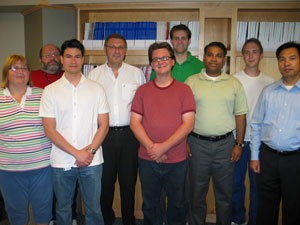 |
Dr. Yuri Persidsky’s research team members are, from left: back row — David Heilman, Dr. Persidsky, Nick Floreani and Aaron Mercer; front row — Brenda Morsey, Dr. Servio Ramirez, Ryan Brodie, Dr. Raghava Potula and Dr. James Haorah. The team is supported by a recently-renewed $2.3 million R01 grant. |
This new grant will explore the idea that inhibition of glycogen synthase kinase-3 beta (GSK-3b) prevents damage to the brain and blood brain barrier in patients with HIV-1 infection.
Dr. Persidsky hopes to use the five-year $2.3 million RO1 renewal grant from the National Institute of Mental Health — a division of the National Institutes of Health — to evaluate the anti-inflammatory effects of GSK-3b.
Deregulation of GSK-3b activity is believed to play a key role in the pathogenesis of such neurodegenerative disorders as Alzheimer’s disease, bipolar disorder and Huntington’s disease.
“Lithium, a GSK-3b inhibitor, has been used for many years to treat bipolar disorder and is being explored for its neuroprotective abilities in Alzheimer’s disease. A recent small clinical trail showed that lithium improved cognition in people with HIV-1,” Dr. Persidsky said. “However, GSK-3b inhibitors have never been assessed for their potential anti-inflammatory effects in the brain or protection of the blood brain barrier.”
The blood brain barrier is composed of highly specialized endothelial cells that control penetration of harmful substances and inflammatory cells trying to get into the brain.
Injury to the blood brain barrier is one of the causes leading to neuronal demise in HIV-1 infection of the brain.
“The work proposed by Yuri Persidsky to explore GSK-3 inhibitors as anti-inflammatory agents in the brain is fascinating,” said Kenneth Williams, Ph.D., an associate professor of medicine at Harvard Medical School. “The possibility that lithium may protect the BBB from damage and from infiltration of monocytes, the main correlate of neuroAIDS, has broad implications to neuroinflammatory diseases, including HIV and multiple sclerosis.”
Previous work done with GSK-3b by Dr. Persidsky’s lab revealed causes of blood brain barrier disruption, one of which is damage done by pro-inflammatory molecules secreted by HIV-1 infected macrophages — or white blood cells — in the brain.
Another cause of damage is related to migration of HIV-1 infected monocytes — an earlier version of a macrophage — into the brain.
Accumulation of these cells in the brain is thought to result in neuronal demise and cognitive impairment.
“Now we have evidence that GSK-3b inhibitors will block migration of infected monocytes, tighten the endothelial barrier and suppress production of toxic compounds by HIV-1 infected macrophages thus protecting the blood brain barrier and ultimately brain tissue,” Dr. Persidsky said.
“The significance of the proposed work is to uncover the novel mechanisms of the anti-inflammatory effects of GSK3b suppression. Also, the availability of GSK-3b inhibitors already approved for clinical use would permit rapid translation of experimental findings into therapeutic applications,” Dr. Persidsky said.
Dr. Persidsky credits the people in his lab for helping him get this far in his research.
“These are very devoted and hard-working people always coming up with innovative ideas and unique technical solutions,” he said. Members of his team specifically working on this project include Raghava Potula, Ph.D., and Servio Ramirez, Ph.D., lab techs Brenda Morsey, David Heilman and Ryan Brodie, and graduate student Aaron Mercer.
Another interesting aspect of the grant is that it will be done using mouse models, whose brains will be scanned via MRI.
Michael Boska, Ph.D., vice chairman for research in the department of radiology at UNMC, developed the technique to do the scans on mice.
“This will allow us to measure the effectiveness of GSK-3b inhibition in live animals,” Dr. Persidsky said.
One interesting note about the grant is that it was approved upon the first submission.
“It’s terrific that this proposal was viewed so strongly in only one singular review, something that rarely happens,” said Howard Gendelman, M.D., chairman of the UNMC Department of Neuroimmune Pharmacology and Experimental Neuroscience. “The growth and research development shown by Dr. Persidsky and his team in recent years has been nothing short of incredible. Yuri is a rich resource and has emerged as a leader in the field of neuroimmunology and neurovirology. We are very proud of his accomplishments.”